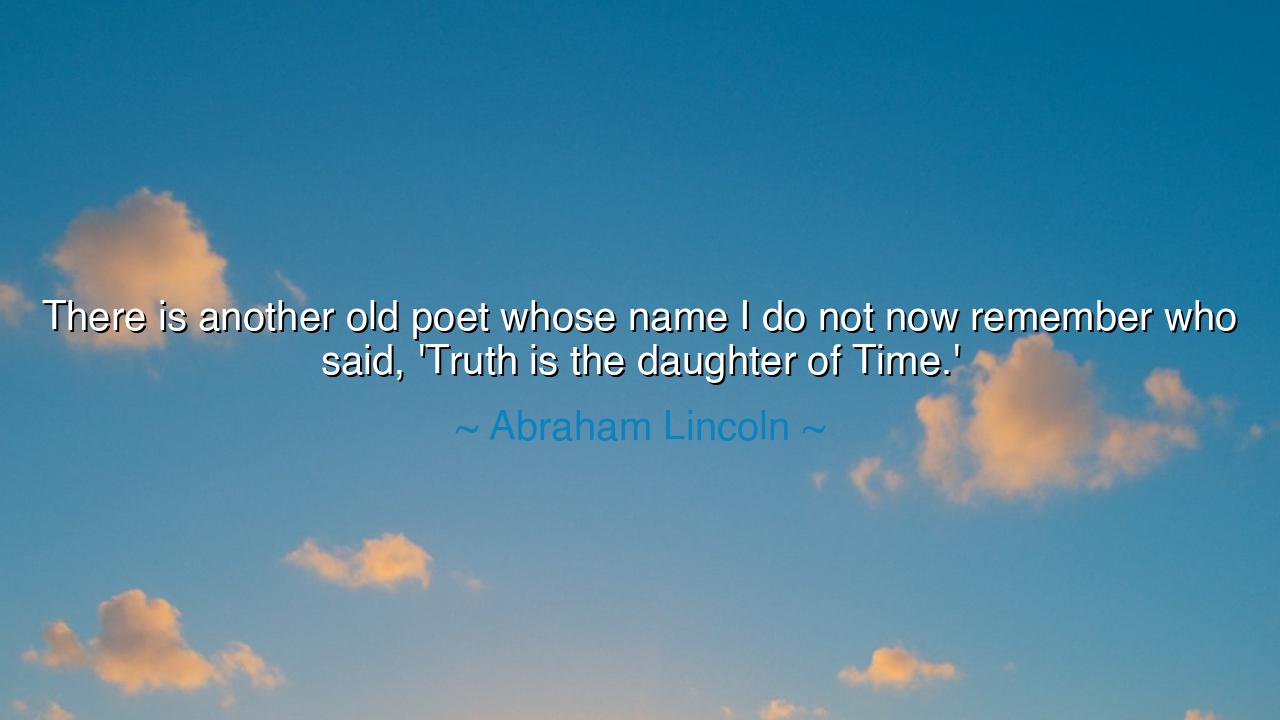
There is another old poet whose name I do not now remember who
There is another old poet whose name I do not now remember who said, 'Truth is the daughter of Time.'






Hear the noble words of Abraham Lincoln, spoken with humility and wisdom: “There is another old poet whose name I do not now remember who said, ‘Truth is the daughter of Time.’” In this saying, Lincoln drew not upon his own imagination, but upon the ancient voices that came before him, weaving their wisdom into the struggles of his own age. For in the turmoil of civil war, when lies and half-truths swirled like storm winds, he reminded his listeners that though falsehood may triumph for a season, truth shall always be born of time.
The meaning of this saying is that truth does not always reveal itself swiftly. Lies are impatient; they seek immediate belief, demanding haste and passion. But truth, like a seed planted deep in the earth, grows slowly, unfolding only when the seasons are ripe. What men cannot see today, what they deny or obscure, time itself will one day reveal. In this sense, truth is not the child of force or cunning, but the patient offspring of time, brought forth by endurance, memory, and the steady march of days.
The ancients knew this well. The Latin phrase “Veritas filia temporis”—“Truth is the daughter of Time”—is attributed to the philosopher Aulus Gellius and echoed by Francis Bacon centuries later. It was a proverb beloved of thinkers and poets alike, for it carried the assurance that falsehood, no matter how artful, cannot outlast the ages. Statues of emperors may crumble, and tyrants’ decrees may vanish, but truth, carried forward by time, will stand like a mountain when all else is dust.
Consider Lincoln’s own era. When the United States was torn by the evil of slavery, countless lies were told to justify it—lies of race, lies of economy, lies of destiny. For generations, those lies held sway. Yet Lincoln, in the fullness of time, declared emancipation, and the truth of human equality, though long delayed, came forth as dawn after a long night. Indeed, slavery seemed immovable in its hour, but time unveiled its falsehood, and truth, though battered, rose to stand eternal.
History gives us many examples. The Galileo affair stands as one. Condemned by the Church for teaching that the earth moved around the sun, Galileo was silenced and his truth suppressed. Yet time, the faithful mother of truth, brought forth his vindication. Centuries later, the world confessed what had always been real: the earth does indeed move. The lies of his age dissolved into shadows, while truth, the daughter of time, stood revealed for all generations to see.
Why is truth bound to time? Because human eyes are dim, and human hearts are slow to believe what is hard or uncomfortable. Lies are pleasing, and truth is often sharp. But time wears down illusions, strips away deceptions, and tests every word. That which is false collapses under the weight of years, while that which is true stands, strengthened by the very trial of endurance. This is why Lincoln, guiding his people through fire, turned to the ancient poet’s words: to give hope that time itself would vindicate the cause of freedom and justice.
The lesson, then, is this: do not despair when truth seems hidden, nor lose heart when lies appear to reign. Trust in time, for time is truth’s ally. Live honestly, stand firmly, and let your life be planted in truth, even if the harvest is delayed. For though falsehood may walk boldly in the morning, truth will stride forth in the evening, crowned by time. As Lincoln reminded us, truth is the daughter of Time—and no lie, however mighty, can silence her forever.






QNNguyen Thi Quynh Nhu
The notion that truth is the daughter of time speaks to the wisdom of patience. It suggests that the full picture of truth is not immediately visible but requires the passing of time to emerge. But does this always hold true in all situations? Are there moments when we are certain of the truth from the beginning, and time only confirms it? I think about how often we second-guess ourselves when time actually brings clarity.
QMNguyen Quang Minh
Lincoln’s quote suggests that truth, like wisdom, is something that matures and becomes clearer over time. This makes me think about how many of us may be quick to judge or assume the truth of a situation without waiting for time to reveal it. How often do we rush to conclusions, only to realize later that the truth was more complex or different than we initially thought?
DLThi Dinh Le
The idea that truth is the daughter of time feels quite profound. Time, in this sense, gives us the opportunity to reflect, analyze, and understand what is real. But can time distort truth as well? Sometimes, the more time we have, the more we forget or misinterpret details. How do we know when the truth we discover with time is genuine and not just a result of shifting perspectives or memories?
BGBg Gh
Abraham Lincoln's reference to truth as the daughter of time is thought-provoking. It suggests that truth isn’t something that’s immediately apparent but something that unfolds gradually with the passage of time. I wonder, is this always the case? Are there truths that emerge quickly and forcefully, or is time necessary for all truths to reveal themselves? How much of our understanding of truth is shaped by our experiences and how time changes our perspective?